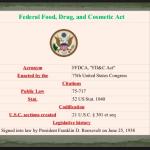From Seattle to New Haven, ACSH crisscrossed America spreading good science news and debunking junk science. We even made a couple of international appearances!
science journalism
A recent New York Times editorial "Cosmetics Safety Needs a Makeover" calls for better FDA regula
In the hotly contested "worst opioid information " contest we may have a new leader: Derek Rose, an "investigative reporter" for WISN, an ABC affiliate in Milwaukee.
The AAAS, which stands for the American Association for the Advancement of Science, is one of the foremost pro-science organizations in the world.
The Beatles song "Here, There, and Everywhere" was about romance, but it also describes ACSH's presence in the media in recent days.
I must be psychic. (And before you ask, no, we aren't getting paid by the dairy industry.)
The CDC released a report on Thursday that should cause widespread celebration: The prevalence of cigarette smoking among adults (14%) is at an all-time low since the federal govern
Some studies are so incredibly stupid, that one wonders how they managed to get published in any scientific journal, let alone a prestigious one. And yet, it has happened, once again1.
In the past decade, has your trust in the news media changed? If you're like most Americans, it has fallen, perhaps substantially.
There is a stinking, pathetic double standard at the heart of scientific publishing, as well as science communication in general:











